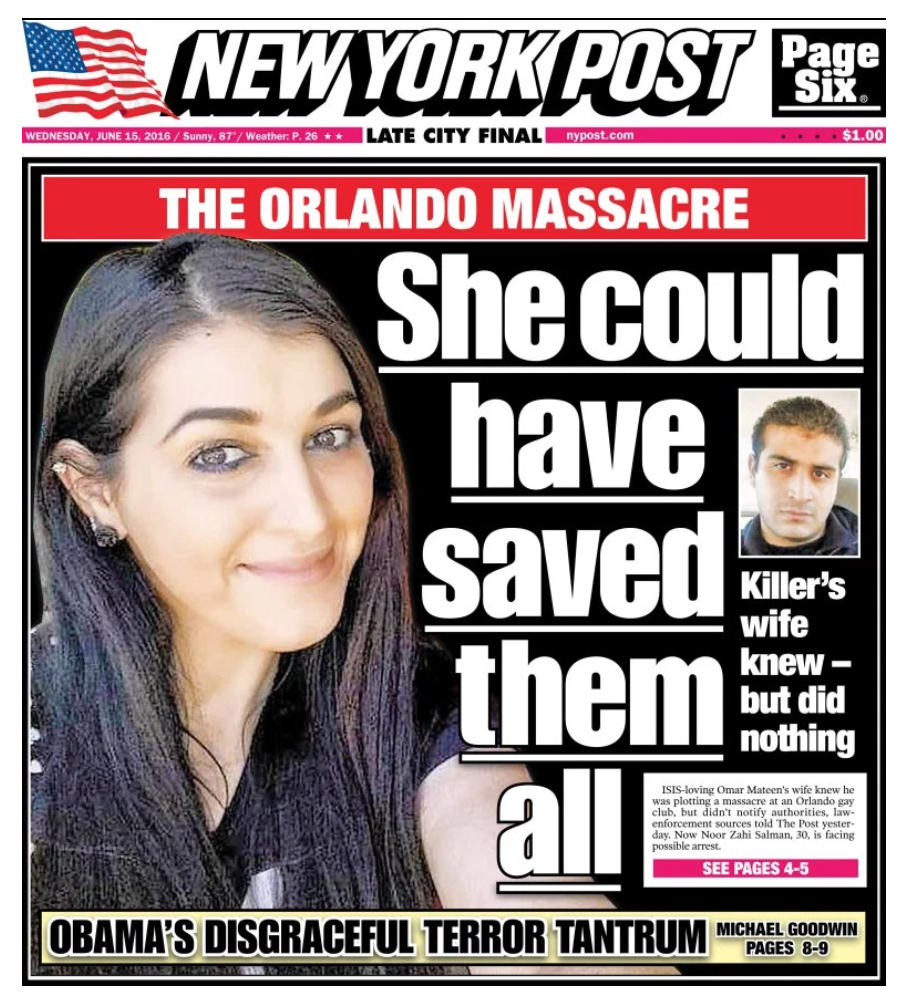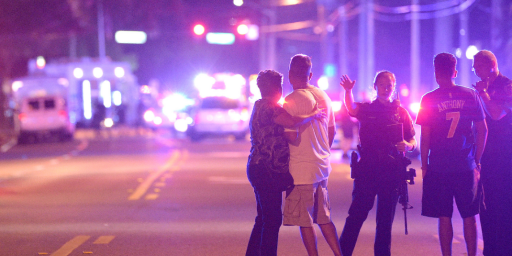Noor Salman Was Acquitted in the Orlando Massacre; She Wasn’t Innocent
The FBI committed gross malfeasance in building a case against the widow of Omar Mateen. She nonetheless bears significant blame for 53 deaths.
Melissa Jeltsen, a senior reporter for HuffPost, claims “Everyone Got The Pulse Massacre Story Completely Wrong” in a story the with subhed “And another, smaller injustice was obscured: the sadistic prosecution of Noor Salman.”
Every mass tragedy begets a frantic search for answers, for a common understanding of what happened, for a narrative, and the 2016 Pulse massacre was no different.
Not long after Omar Mateen opened fire inside a bustling gay nightclub in Orlando, Florida, the media scrambled to understand his depraved actions. Almost overnight, a narrative emerged that until now has been impossible to dislodge: Mateen planned and executed an attack on Pulse because he hated gay people.
“Let’s say it plainly: This was a mass slaying aimed at LGBT people,” Tim Teeman wrote in The Daily Beast. The massacre was “undeniably a homophobic hate crime,” Jeet Heer wrote in The New Republic. Some speculated that Mateen was a closeted gay man. He was likely “trying to reconcile his inner feelings with his strongly homophobic Muslim culture,” James S. Robbins wrote in USA Today.
There was compelling evidence of other motivations. Mateen had pledged allegiance to the self-described Islamic State during the shooting, and explicitly said that he was acting to avenge air strikes in the Middle East. “You have to tell America to stop bombing Syria and Iraq. They are killing a lot of innocent people,” he told a crisis negotiator over the phone while at Pulse. “What am I to do here when my people are getting killed over there. You get what I’m saying?”
But this was a tricky thing to get a handle on — 49 dead and another 53 wounded, so many of them members of a historically marginalized and persecuted group. How could they not have been targeted? To say that the attack was not “rooted in homophobia,” one commenter wrote in USA Today, was to “erase the LGBT community … causing only more pain by invalidating their experiences.”
Over the past two weeks in Orlando, Mateen’s widow, Noor Salman, was tried for having allegedly helped him plan his attack. The popular understanding of the Pulse shooting as a carefully targeted massacre was on trial as well. And in acquitting Salman, 31, on Friday, a jury also delivered a verdict on the story we’d told ourselves about the killings: We’d gotten it wrong.
In the wake of the shooting, the media and public focused on certain details, many of which were later determined to be unfounded, and discounted others, like Mateen’s own explanation for his actions. If Mateen had indeed been motivated by something other than homophobia, the grief and terror of the gay community were no less real and no less urgent for it. But the narrative that was repeated and turned into fact ― that Mateen had picked Pulse because of who its patrons were and what they represented ― had the effect of obscuring another, smaller injustice: the prosecution of Mateen’s wife.
A Muslim woman who by her family’s account was beaten by Mateen, Salman might have been a sympathetic figure in a different context. But I think now of Bob Kunst’s sign. A longtime human rights activist, Kunst was protesting outside the federal courthouse, just two miles from the nightclub where the tragedy occurred, as Salman’s trial began. “‘FRY’ HER,” his sign read, “TILL SHE HAS NO ‘PULSE.'” It didn’t seem to occur to many people that Noor Salman might have been a victim of Mateen, too.
“The media missed the story,” Charles Swift, one of Salman’s lawyers said, “because they depended on the government to tell it to them.”
Salman’s trial cast doubt on everything we thought we knew about Mateen. There was no evidence he was a closeted gay man, no evidence that he was ever on Grindr. He looked at porn involving older women, but investigators who scoured Mateen’s electronic devices couldn’t find any internet history related to homosexuality. (There were daily, obsessive searches about ISIS, however.) Mateen had extramarital affairs with women, two of whom testified during the trial about his duplicitous ways.
Mateen may very well have been homophobic. He supported ISIS, after all, and his father, an FBI informant currently under criminal investigation, told NBC that his son once got angry after seeing two men kissing. But whatever his personal feelings, the overwhelming evidence suggests his attack was not motivated by it.
As far as investigators could tell, Mateen had never been to Pulse before, whether as a patron or to case the nightclub. Even prosecutors acknowledged in their closing statement that Pulse was not his original target; it was the Disney Springs shopping and entertainment complex. They presented evidence demonstrating that Mateen chose Pulse randomly less than an hour before the attack. It is not clear he even knew it was a gay bar. A security guard recalled Mateen asking where all the women were, apparently in earnest, in the minutes before he began his slaughter.
In her news conference on June 21, 2016, then-U.S. Attorney General Loretta Lynch called the attack “an act of terror and an act of hate” and pledged to examine all possible motivations for Mateen’s actions.
Seven months after the shooting, Salman was hit with federal terrorism charges for allegedly aiding and abetting her husband. But hate crime charges never came — “and now you know why,” said Swift. Despite the overwhelming public consensus, there apparently wasn’t enough evidence for a hate crime classification. In fact, the 2016 Hate Crimes in Florida Report does not include the 49 victims of the Pulse shooting in its official total. “These crimes were not classified as hate crimes by the Orlando Police Department in the Uniform Crime Reporting Information System,” the report noted.
From the start, the evidence against Salman was paper-thin and hinged on a “confession” that an FBI agent hand-wrote for her after an 11-hour interrogation in the immediate aftermath of the massacre that was neither filmed nor recorded. Her lawyers maintain the statement was coerced.
In it, Salman claimed she knew Mateen was headed to Pulse that night, and that they’d scouted the location together. But within a few days of the massacre, the government had reason to believe her statement was false. Based on data from their cell phones, neither Mateen or Salman had ever been in the vicinity of Pulse before. On the night of the attack, Mateen first went to Disney Springs and EVE Orlando ― both of which had heavy, visible security ― before ending up at Pulse after a Google search for “downtown Orlando nightclubs.” Notably, his search did not include the words “gay” or “LGBT.”
The evidence suggested it was a crime of opportunity, the location chosen at random. If Mateen didn’t know where he was going that night, how could his wife have known? How could she, in the words of the June 15, 2016, New York Post cover, “have saved them all”?
Prosecutors decided to pursue charges against Salman anyway, knowing full well that the statements she gave the FBI could not be corroborated. It was as if authorities were drawing up an indictment to fit the public’s conception of the crime, even if their strongest proof was at odds with other evidence they’d collected.
“[T]he agents had coerced Noor into agreeing that Omar Mateen had cased the Pulse and selected the nightclub as his target,” said Swift in an email, “and it was not in the government’s interest to contradict that narrative.”
There’s a lot more but that’s the gist of the report. Jeltsen is certainly right that the FBI case against Salman was weak, if not trumped up. But, while Salman was doubtless abused by her husband, she’s no innocent here. She could indeed have stopped the massacre.
James Bovard, a columnist for USA Today, rightly excoriates the FBI in his column “After the FBI’s Pulse nightclub failure, why should we trust James Comey anymore?”
The FBI suffered another debacle on Friday when an Orlando jury returned a not guilty verdict for the widow of Omar Mateen, who killed 49 people and wounded 53 in his attack on Orlando’s Pulse nightclub in June 2016. The biggest terrorism case of the year collapsed largely thanks to FBI misconduct and deceit.
Noor Salman was charged with material support of a foreign terrorist organization and lying to the FBI about knowing about her husband’s pending attack on the nightclub. The FBI vigorously interrogated her for 18 hours, threatening her with the loss of custody of her infant son unless she signed a confession. Salman, who reportedly had an IQ of only 84, initially denied any knowledge but relented and signed a statement composed by an FBI agent.
Federal prosecutors flourished the FBI memo of Salman’s confession as the ultimate proof of her perfidy. But the memo contained false statements and contradictions which even the government could not sweep away. After the trial ended, the jury foreman (who wished to remain anonymous) notified the Orlando Sentinel: “I wish that the FBI had recorded their interviews with Ms. Salman as there were several significant inconsistencies with the written summaries of her statements.”
There’s quite a bit more there and none of it reflects well on America’s premier law enforcement agency. Ditto the NYT report “Noor Salman Acquitted in Pulse Nightclub Shooting.”
Jurors unanimously rejected government charges that Ms. Salman had helped her husband plan his violent assault in the name of the Islamic State — a narrative countered by her family’s claims that she was kept in the dark about her husband’s secrets and was home sleeping when the attack occurred.
To blame for the government’s defeat, said defense lawyers and legal experts who closely followed the trial, was a flimsy circumstantial case that ultimately was unable to persuade jurors during the eight days of trial.
Testimony from an F.B.I. agent revealed that prosecutors knew early on, but did not reveal, that one of their crucial initial pieces of evidence — that Ms. Salman had admitted driving by the nightclub with her husband in the days before the attack — most likely did not happen.
Prosecutors also faltered when they argued that Ms. Salman had created an alibi for her husband the night of the shooting, telling Mr. Mateen’s mother that he was out to dinner with a friend identified only as Nemo. But that line was Mr. Mateen’s own lie to his wife, defense lawyers argued. They put Nemo on the stand, over prosecutors’ objections, to testify that he knew Mr. Mateen had used him in the past as a cover story to cheat on his wife.
“The more we learned, the better Noor Salman looked,” Charles D. Swift, one of her lawyers, told reporters after the verdict was announced.
But here’s a rather important nugget buried deep in the NYT story:
Late Friday, the jury foreman said in a statement to The Orlando Sentinel that the verdict did not mean jurors thought Ms. Salman was unaware of Mr. Mateen’s plans.
“On the contrary, we were convinced she did know,” the foreman told The Sentinel, asking to remain anonymous and saying he was speaking on his own behalf. “She may not have known what day, or what location, but she knew. However, we were not tasked with deciding if she was aware of a potential attack. The charges were aiding and abetting and obstruction of justice.”
And on those charges, he said, the jury was presented with “no option” but to acquit.
The FBI’s malfeasance here meant that she absolutely should have been acquitted. Jeltsen is probably right that her husband did not consider her an equal worthy of being his co-conspirator. But the jury was persuaded that Salman knew that her husband planned to murder large numbers of innocents and did nothing to stop that. The New York Post headline that Jeltsen mocks–“She could have saved them all: The Killer’s wife knew–and did nothing” was precisely correct. Her missing her grandmother’s funeral and being unable to hug her son for a year seems like a rather small price to pay for that.







James–are you talking morally or legally?
Also, given the power dynamics between Noor and her husband, there may be a very good reason she didn’t do anything: she was afraid.
@grumpy realist:
Morally. IANAL but don’t think we can require a wife to report a husband’s planned crimes.
Sure. But lots of afraid people speak up in the face of an impending massacre.
As a general rule, she could only have been charged if she aided or abetted the crime in some way or somehow became involved in a criminal conspiracy in even a minor respect. This was apparently the basis of the prosecution’s charges against her and they failed to prove their case.
So, yea, legally she is not guilty. From a moral point of view, though, one can certainly argue that she had some obligation to come forward and report what she may have known about her husband’s actions and plans. If he was using fear and intimidation to keep her quiet, that may mitigate her moral guilt to some respect, but it doesn’t necessarily absolve it completely.
1. Armed security made him pick an easier target? Funny how that works.
And I doubt Disney security is walking around with AR-15s.
2. Is it OK to bash the FBI again? Because I’ve been reading a lot about how everyone needs to stop doing that.
An IQ of 84?
If she was orange and had stupid hair she could be President.
“She knew something, she could have done something”
Like all the people in Florida that called the cops, and the FBI, on the shooter?
Like the father who called the cops on the YouTube shooter?
When her father in law was an FBI informant already?
I think this is pretty much the weakest post I’ve seen on OTB from a reasoned argument point of view. But, seeing how it’s based on a NY Post article, that’s probably not surprising.
@ TMzero
It’s fine to bash the FBI. They sure the hell aren’t perfect, and deserve to be bashed…like when Comey helped Dennison win the election. But it’s not fine to obstruct justice, as your man-crush is actively doing. Big difference.
@Mu: I haven’t followed the ins and outs of the case but I’ve never seen anything indicating his father turned him in to the FBI. And the only thing in this story linked to the NY Post is the cover story and quote of the headline. The rest is based on an extensive HuffPost essay, a USA Today op-ed, and a detailed NYT report, all of which are hyperlinked and named in the post.
@Doug Mataconis: Except that if her husband was someone who flew off the handle all the time and did nothing, she may have thought this was a big nothingburger as well.
Also, it’s hard enough for a battered woman to do anything, let alone contact authorities. Just saying “well, she should have done something” doesn’t look at the situation she may have found herself in.
@James Joyner: “Morally guilty” is not a recognized infraction requiring the state to apply sanctions to the best of my knowledge. Our system is not infallible, for example I think OJ killed Nicole. We have certain built-in features like presumption of innocence, protection against self-incrimination, etc. Which features of the American system would you like to see changed, Dr. Joyner?
Also, I don’t understand why mistakes in this prosecution mean that we should dismiss the entire structure of investigations that the FBI has undertaken. We recognize that the FBI is not infallible, but on the whole they have done a pretty good job. J. Edgar Hoover made some real mistakes, but the bottom line on the FBI is pretty strongly in the plus column. Mueller investigated Gotti for years and finally got him; if I were Trump, only complete certainty of innocence would allow good sleep.
@Slugger: I don’t see anywhere in the post where I argue that she ought be further sanctioned by the state for being “morally guilty.” I merely push back against the notion that she’s purely an innocent victim here.
@grumpy realist:
I just recently ended a relationship with someone who I had dated for about two years, off and on…one of the strongest people I’ve ever known. Fiercely so. A successful psychologist and an endurance athlete.
And yet, she had been abused for a long period of time by a previous boyfriend.
You are right…you can never ever judge situations from the outside…they just rarely make sense.
James, on top of the abuse component, people in marginalized communities have easily demonstrated reasons to be skeptical of reaching out to law enforcement, as evidenced by your post earlier this week regarding the MS-13 informant.
It doesn’t help your argument to include a sensationalist front page of the New York Post that makes her an accomplice when the substance of the quoted excerpts from other publications and the jury’s verdict and comments from one of them contradict the Post’s statements on the front page. Or, were you trying to get in a slam against Obama for “terror tantrums” ?
@dmichael: The impetus for the post was the HuffPost story that I saw this morning. A little digging showed that the minor premise of the piece was flat out wrong. The Post headline was in fact right, down to the subhed. (The claim made in the small call-out box, invisible in this screencap, was in fact wrong.)
So, you believe that someone with an IQ of 84 should be held responsible for not cleverly figuring out some way to stop her husband from doing what he wanted to do? Or do you have secret evidence that she was actually much smarter and more capable than this story implies?
I failed to prevent millions of deaths due to malaria last year. I guess I’m culpable too.
@DrDaveT: The jurors who heard all the evidence were convinced that she knew her husband planned to commit a massacre but didn’t know ahead of time it was going to be that particular venue. An 84 IQ person knows that’s wrong. Yet she didn’t call the police or otherwise try in any way to stop him.
I think you guys are putting far too much emphasis on IQ, a measure of cognitive ability. Distinguishing right from wrong is socio-emotional development, a completely different plane.
Can someone point to any evidence that shows that she may known- I just don’t see it- the confession was written by the police- the opinion by a jury member is merely that- from what I read- the shooter himself did not know the target until the actual shooting – so what exactly people think she knew and based on what?
@Raoul:
The charge was that she knew the exact details; the trial proved that she couldn’t have. It also left the jury persuaded that she absolutely knew about the plot–just not the exact time and place where it would be carried out.
I have done a little research on the matter and the only evidence I have seen against her is the fabricated and coerced confession that was prepared (even written) by an FBI agent- how much of it is true is impossible to assess but it is certainly filled with provable false assertions- and no video-unbelievable- is there any other evidence? To be clear- what a juror says after a trial is of very little consequence.